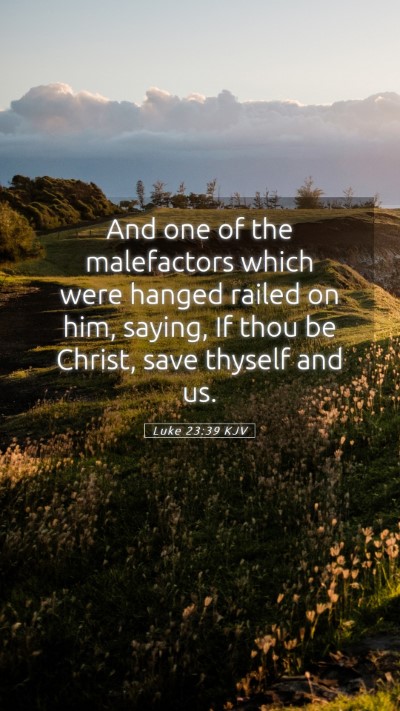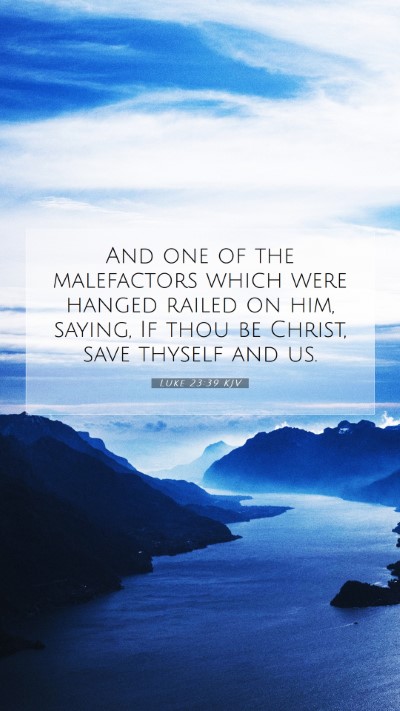Bible Verse Meaning: Luke 23:39
Luke 23:39 states: "One of the criminals who hung there hurled insults at him: 'Aren't you the Messiah? Save yourself and us!'"
This verse is situated in a profound moment of the crucifixion, where Jesus is nailed to the cross alongside two criminals. The verse presents a critical reflection on the human response to Jesus during his suffering and the significance of belief.
Summary of Luke 23:39
In Luke 23:39, we see one of the criminals mocking Jesus as he hangs on the cross, demonstrating a lack of faith and understanding of Christ's mission. His challenge implies that if Jesus truly is the Messiah, he should save himself and the others crucified alongside him. This moment underscores the theme of rejection and scorn faced by Jesus, even in the final moments of his life.
Insights from Public Domain Commentaries
-
Matthew Henry’s Commentary:
Henry emphasizes the irony of the situation: the mocked Savior is being scorned by someone who is also facing judgment. This highlights the pervasive unbelief of the time and reflects the contempt held by some towards spiritual authority. Henry notes that even in despair, some individuals fail to recognize the divine grace before them.
-
Albert Barnes’ Notes:
Barnes explains the implications of the criminal's words. By sarcastically insisting Jesus prove his power to save, the criminal reveals a lack of understanding of Jesus's purpose. Barnes explains that true recognition of Jesus as the Messiah requires faith and humility, qualities absent in the taunts of the criminal.
-
Adam Clarke’s Commentary:
Clarke points out the reoccurring theme of mockery in the passion narrative. He suggests that the criminal's scorn is a reflection of the broader societal rejection of Jesus. Clarke also notes the significance of the parallel between the two criminals, representing two responses to Jesus: faith and unbelief, which serves as a great allegory for humanity at large.
Theological Implications
This verse raises significant theological questions about faith, redemption, and human response to Christ. It represents a larger narrative of sin and the need for humility before God. The mocking of Jesus not only situates him among criminals but also illustrates the tragic irony of rejecting the very Messiah who offers salvation.
Applications for Today
Luke 23:39 challenges believers to consider their own responses to Jesus. Are there areas of life where we demonstrate skepticism towards God’s power and grace? The verse also serves as a reminder of God's patience and willingness to forgive even those who have wronged Him.
Cross References
- Matthew 27:44 - "In the same way the rebels who were crucified with him also heaped insults on him."
- Luke 23:40-43 - The contrasting response of the other criminal who acknowledges Jesus' innocence and asks for remembrance.
- John 18:36 - Jesus speaks of His kingdom not being of this world, which sets a context for understanding what 'saving' means.
- Isaiah 53:3 - A prophecy about the suffering servant who is despised and rejected.
- Romans 5:8 - God demonstrates His love for us in that while we were still sinners, Christ died for us.
Conclusion
The exploration of Luke 23:39 through the lens of various commentaries provides a comprehensive understanding of the depths of humanity's response to Christ. It emphasizes the need for personal reflection in light of Jesus' ultimate sacrifice. This verse serves as a pivotal point for anyone seeking deeper biblical insights and a greater understanding of Scripture.


